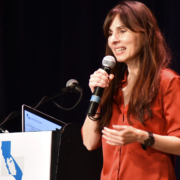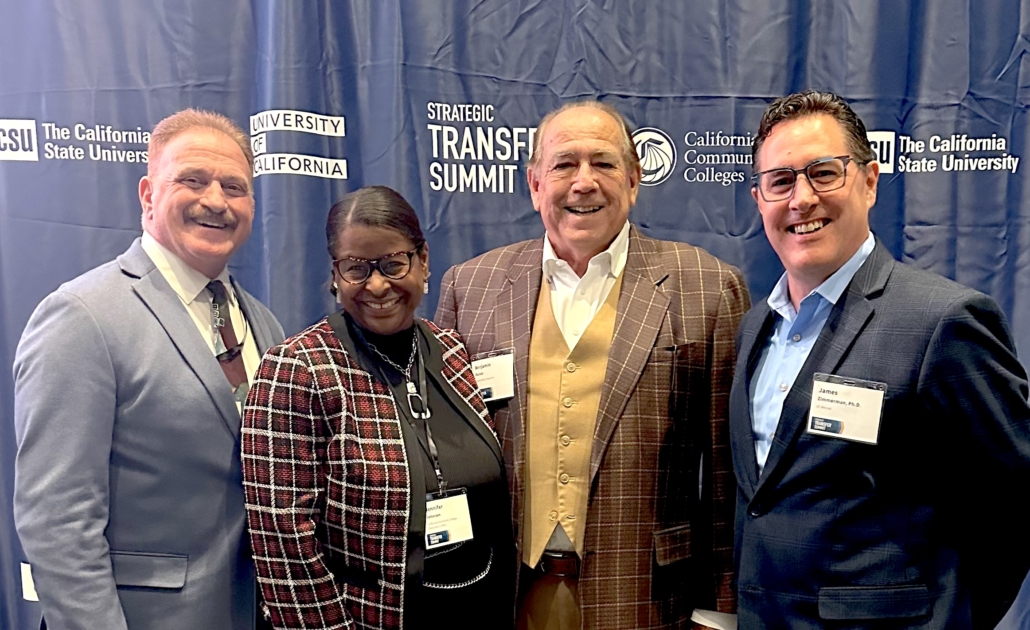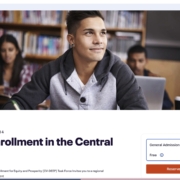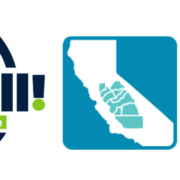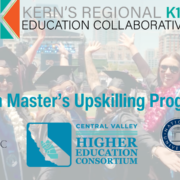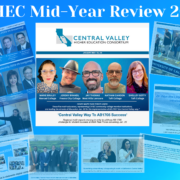CCC Chancellor Sonya Christian to deliver keynote at Central Valley Dual Enrollment Convening Feb. 3 in Fresno Agenda includes pre-conference session for schools new to dual enrollment Dr. Sonya […]
CVDEEP Task Force convening for educators in 10-county region to look at strategic planning, policy changes, student success and equity REGISTER HERE The Central Valley Dual Enrollment for […]
Successful dual enrollment teacher program awarded funding for 15 more high school teachers To schedule an information session: individual OnDemand appointments BY TOM URIBES CVHEC Communications Coordinator The success […]
Executive Director Benjamín Durán (third from left) led the CVHEC delegation at the Strategic Transfer Summit with Transfer Project Lead Stan Carrizosa, Jennifer Johnson of California Community Colleges Foundation and Dr. James Zimmerman of UC Merced. (Photo below): The California Economic Summit in October was attended by Ángel Ramírez, Elaine Cash, Tom Uribes (back), Priscilla Arrellano posing with Assemblyman Joaquin Arambula.
Strategic Transfer Summit provides showcase for
CVHEC’s Transfer Project as reps make the rounds
Central Valley Higher Education Consortium delegations are making the rounds this fall at several state and national conferences including the recent Strategic Transfer Summit presented by the California Community Colleges Nov. 8 at UC Merced.
Other destinations include the Complete College America National Conference in Indianapolis Nov. 18-20; the American Mathematical Association of Two-Year Colleges (AMATYC) in Atlanta Nov. 14-17 through the Dana Center with CVHEC Math Task Force members Jeremy Brandl of Fresno City College and Shelley Getty of Taft College; and the Community Colleges League of California Nov. 22 in Sacramento.
 CVHEC also attended the California Economic Summit held Oct. 8-10 in Sacramento.
CVHEC also attended the California Economic Summit held Oct. 8-10 in Sacramento.
At the recent Transfer Summit, CVHEC’s Transfer Project team presented an update on its progress in partnering with the consortium’s 15 community college members using the Program Pathway Mapper software for a smoother transfer process for students. Leading the CVHEC delegation at the UC Merced event was Executive Director Benjamín Durán and Transfer Lead Stan Carrizosa along with James Zimmerman vice chancellor of UC Merced and Jennifer Johnson California Community Colleges Foundation.
Carrizosa said the summit, attended by the chief executive officers of the state’s three public higher ed segments – the University of California, the California State University and the California Community Colleges – provided a prime opportunity to showcase the consortium’s Transfer Project.
“The participation of the statewide CEOs of CCC, CSU & UC — coupled with powerful student testimony — makes this event an inflection point that sets our Transfer Project on its next upward trajectory,” Carrizosa said.
 CVHEC’s Transfer Project has been designated as a California Community Colleges Demonstration Project by Chancellor Sonya Christian to serve as a model systemwide.
CVHEC’s Transfer Project has been designated as a California Community Colleges Demonstration Project by Chancellor Sonya Christian to serve as a model systemwide.
This month, Duran will also attend the CLCC in Sacramento as well as lead the CVHC delegation to the CAC national conference in Indiana. Attending the CAC with him will be Angel Ramirez, operations/finance director; Elaine Cash, grants coordinator; and Tom Uribes, communications/media coordinator.
For the CA Economic Summit in October, Ramirez, Cash and Uribes were joined by Priscilla Arrellano, administrative specialist.
CVDEEP Convening planned for Feb. 3, 2025
[UPDATE DEC. 18, 2024]: This event is rescheduled for Feb. 3, 2025. See updated story: https://bit.ly/CVHEC-DualEnrollConv25
Math Bridge and Master’s Upskilling heading north via WE Will! K-16 funding ‘Together, we are creating pathways for success that will benefit our communities for generations to come.’ […]
The drive is on to place the program’s master’s grads in Kern community college adjunct spots The Kern Master’s Upskill Program continues to forge ahead as four cohorts of […]

